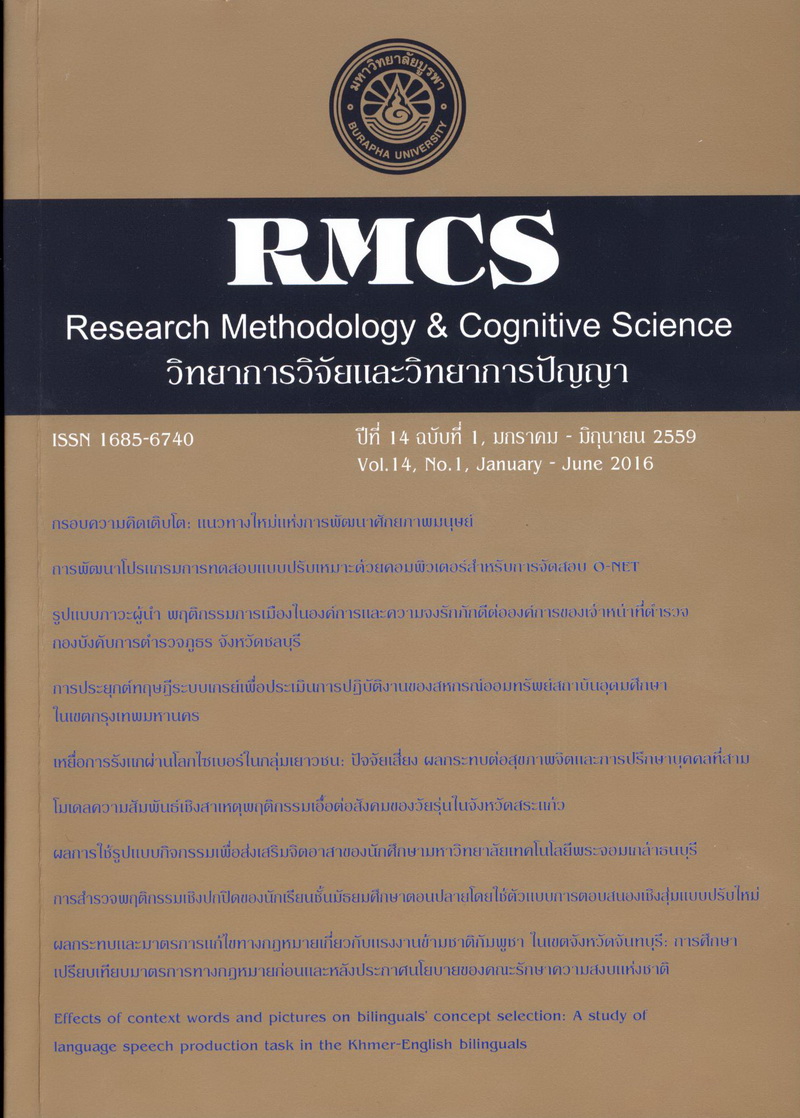รูปแบบภาวะผู้นำพฤติกรรมการเมืองในองค์การและความจงรักภักดีต่อองค์การของเจ้าหน้าที่ตำรวจกองบังคับการตำรวจภูธร จังหวัดชลบุรี
Main Article Content
Abstract
การวิจัยนี้มีวัตถุประสงค์เพื่อ 1) ศึกษารูปแบบภาวะผู้น า พฤติกรรมการเมืองในองค์การ และความจงรักภักดี
ต่อองค์การของเจ้าหน้าที่ต ารวจ สังกัดกองบังคับการต ารวจภูธรจังหวัดชลบุรี 2) ศึกษาอิทธิพลทางตรงและทางอ้อม
ของรูปแบบภาวะผู้น าและพฤติกรรมการเมืองในองค์การต่อความจงรักภักดีต่อองค์การของเจ้าหน้าที่ต ารวจ สังกัด
กองบังคับการต ารวจภูธรจังหวัดชลบุรี และ 3) พัฒนาโมเดลเชิงสาเหตุรูปแบบภาวะผู้น า พฤติกรรมการเมืองในองค์การ
และความจงรักภักดีต่อองค์การของเจ้าหน้าที่ต ารวจ กองบังคับการต ารวจภูธรจังหวัดชลบุรี โดยศึกษากลุ่มตัวอย่าง
จ านวน 347 คน ใช้แบบสอบถามเป็นเครื่องมือในการเก็บรวบรวมข้อมูลและวิเคราะห์ข้อมูลด้วยเทคนิคการวิเคราะห์
สมการเชิงโครงสร้าง ผลการศึกษา ปรากฏว่า โมเดลที่พัฒนาขึ้นมีความสอดคล้องกับข้อมูลเชิงประจักษ์ โดยตัวแปร
ที่มีอิทธิพลโดยรวมต่อความจงรักภักดีต่อองค์การของเจ้าหน้าที่ต ารวจมากที่สุดคือ ภาวะผู้น าแบบปล่อยเสรี
รองลงมาคือ ภาวะผู้น าการเปลี่ยนแปลง พฤติกรรมการเมืองในองค์การและภาวะผู้น าแบบแลกเปลี่ยนตามล าดับ
ทั้งนี้ ภาวะผู้น าแบบปล่อยเสรี และภาวะผู้น าแบบแลกเปลี่ยนมีอิทธิพลทางบวกต่อความจงรักภักดีต่อองค์การ
ในขณะที่พฤติกรรมการเมืองในองค์การ และภาวะผู้น าแบบแลกเปลี่ยนมีอิทธิพลทางลบต่อความจงรักภักดีต่อ
องค์การ
Leadership styles, political behaviors, and organizational loyalty of police officers of Chon Buri provincial police
The objectives of this study were (1) to study leadership styles, political behaviors, and
organizational loyalty of police officers of Chon Buri Provincial Police (2) to study direct and
indirect effects of leadership styles and political behaviors on organizational loyalty of police
officers of Chon Buri Provincial Police (3) to develop causal model of leadership styles, political
behaviors, and organizational loyalty of police officers of Chon Buri Provincial Police. The
samples of this study were 347 police officers. A questionnaire was employed to collect the data.
Then, the data were analyzed using structural equation modeling technique. The study found that
the developed model was fit with the empirical data. Laissez-faire leadership, transformational
leadership, political behaviors, and transactional leadership were the most influential factor s
affecting organizational loyalty respectively. Laissez-faire, and transformational leadership had
a positive influence while the political behaviors, and the transactional leadership had a negative
influence on the organizational loyalty.
Article Details
References
ไวพจน์ กุลาชัย. (2552). การเมืองในองค์การและทัศนคติของข้าราชการต ารวจเกี่ยวกับประสิทธิผลขององค์การ:
กรณีศึกษากองบัญชาการต ารวจนครบาล. ดุษฎีนิพนธ์ปรัชญาดุษฎีบัณฑิต สาขาวิชารัฐประศาสนศาสตร์,
บัณฑิตวิทยาลัย มหาวิทยาลัยรามค าแหง.
สุชาติ ประสิทธิ์รัฐสินธุ์. (2546). ระเบียบวิธีการวิจัยทางสังคมศาสตร์ (พิมพ์ครั้งที่ 12). กรุงเทพมหานคร: เฟื่องฟ้า
พริ้นติ้ง.
Chughtai, A. A., & Zafar, S. (2006). Antecedents and consequences of organizational commitment
among Pakistani university teachers. Applied H.R.M. Research, 11(1), 39-64.
Ding, D., Lu, H., Son, Y., & Lu, Q. (2012). Relationship of servant leadership and employee loyalty:
The mediating role of employee satisfaction. iBusiness, 4, 208-215.
Hitt, M. A., Miller, C. C., & Colella, A. (2011). Organizational Behavior (3rd ed.). New Jersey: John
Wiley & Sons.
Innes, P. B. (2004). The influence of leadership on perceptions of organizational politics, job
involvement, and organizational commitment. Dissertation Abstract International,
(07), 192-A. (UMI No. 3138653).
Iqbal, M. S., Tufail, M. S., & Lodhi, R. M. (2015). Employee loyalty and organizational commitment
in Pakistani organizations. Global Journal of Human Resource Management, 3(1), 1-11.
Kacmar, K. M., Andrews, M. C., Harris, K. J., & Tepper, B. J. (2013). Ethical leadership and
subordinate outcomes: The mediating role of organizational politics and the moderating
role of political skill. Journal of Business Ethics, 115, 33-44.
LaCost, H. A. (2005). Attributions of organizational politics: An investigation of locus of causality,
justice, and intentionality as factors in perceptions of politics. Dissertation Abstract
International, 66(04), 168-A. (UMI No. 3173590).
Martensen, A., & Gronholdt, L. (2006). International marketing: A study of employee loyalty, its
determinants and consequences. Innovative Marketing, 2(4), 92-116.
Miller, B. K., Rutherford, M. A., & Kolodinsky, R. W. (2008). Perceptions of organizational politics: A
meta-analysis of outcomes. Journal of Business Psychology, 22, 209-222.
Preko, A., & Adjetey, J. (2013). A study on the concept of employee loyalty and engagement on
the performance of sales executives of commercial banks in Ghana. International
Journal of Business Research and Management (IJBRM), 4(2), 51-62.
Robbins, S. P. (2003). Organizational Behavior (10th ed.). New Jersey: Prentice-Hall.
Robbins, S. P., & Judge, T. A. (2012). Essentials of Organizational Behavior. Essex: Pearson Education.
Suharti, L., & Suliyanto, D. (2012). The effects of organizational culture and leadership style
toward employee engagement and their impacts toward employee loyalty. World
Review of Business Research, 2(5), 128-139.
Vigoda-Gadot, E. (2007). Leadership style, organizational politics, and employees’ performance: An
empirical examination of two competing models. Personnel Review, 36(5), 661-683.

